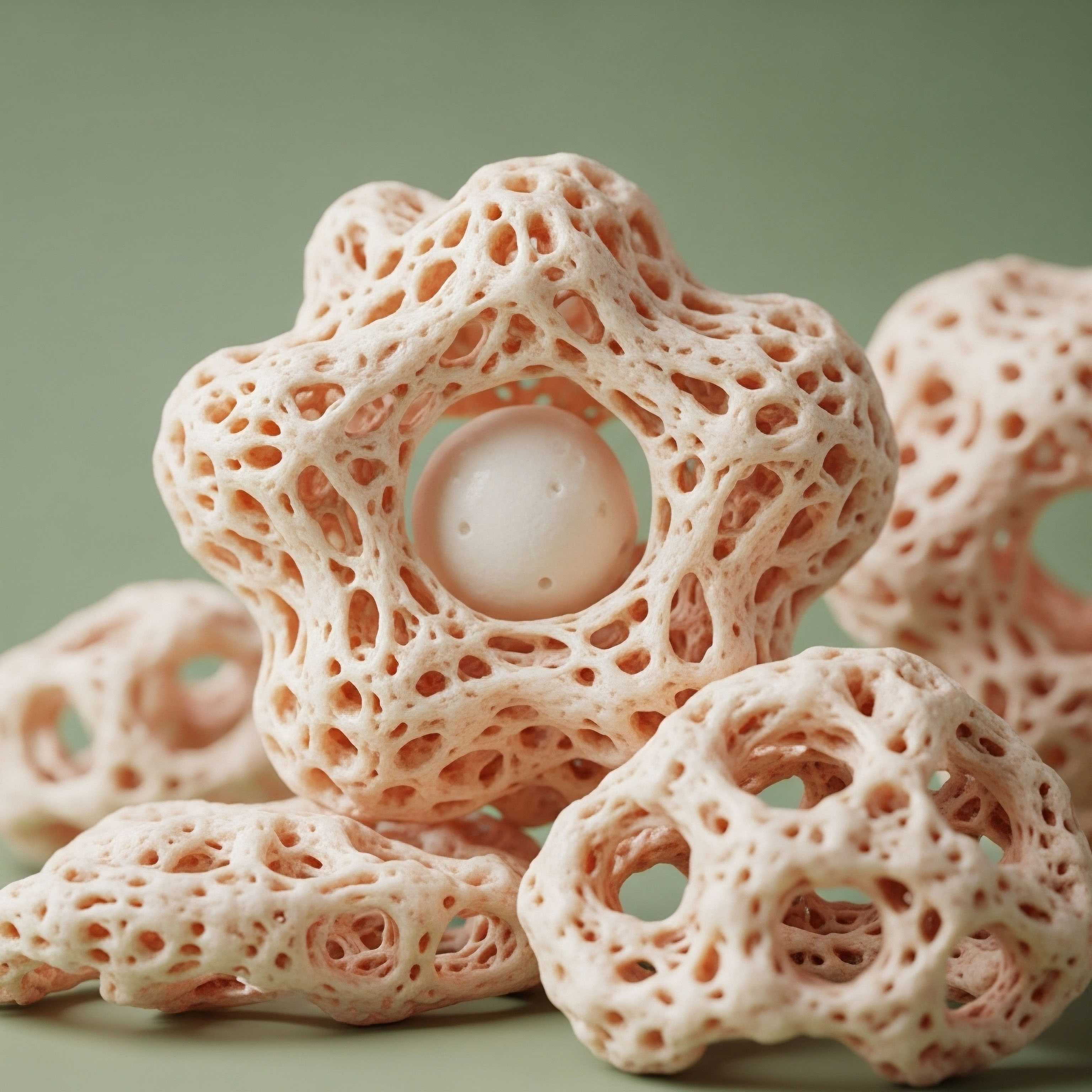

Fundamentals
The subtle shift in your cognitive landscape, the moment a name or a word hovers just out of reach, is a deeply personal and often unsettling experience. It is a feeling of your own internal processor slowing down, a change that many people quietly accept as an inevitable part of aging.
This experience is real, and its origins are seated within the body’s most intricate communication network ∞ the endocrine system. Your biology is speaking to you, and understanding its language is the first step toward reclaiming your cognitive vitality. The brain does not function in isolation; it is a profoundly receptive organ, constantly bathed in and responding to the flow of hormonal messengers that govern everything from your energy levels to your mood and, critically, your cognitive clarity.
At the center of this conversation are the sex hormones ∞ estrogen, progesterone, and testosterone. Think of these molecules as powerful conductors of your biological orchestra. For decades, they have directed cellular function with precision. As their production naturally wanes with age, certain sections of the orchestra can fall out of sync.
This hormonal transition is a primary driver of the cognitive changes you may be experiencing. It is a physiological shift, a change in your internal biochemical environment that directly impacts the brain’s ability to form memories, maintain focus, and process information with speed and accuracy.
The sensation of cognitive decline is often a direct signal from the brain responding to fundamental shifts in your body’s hormonal environment.

The Conductors of Cognition
Each of these hormonal conductors plays a specific role in maintaining the brain’s high-performance state. Their influence is woven into the very fabric of your neural architecture, and understanding their individual contributions helps to clarify why their decline is felt so acutely.

Estrogen the Master Regulator
Estrogen, particularly estradiol, is a cornerstone of neurological health in both women and men, although its levels are much higher in women. It acts as a master regulator, supporting the growth and survival of neurons, the brain cells that transmit information.
It also promotes synaptic plasticity, the ability of your brain to form new connections, which is the physical basis of learning and memory. Estrogen helps maintain healthy blood flow to the brain, ensuring a steady supply of oxygen and glucose, the brain’s primary fuel. Its decline can lead to a measurable reduction in this support system, contributing to difficulties with verbal memory, the task of recalling words and conversations.

Progesterone the Calming Agent
Progesterone is often thought of in the context of the female reproductive cycle, yet its role extends deep into the central nervous system. It has a calming, neuroprotective effect, helping to shield brain cells from damage and reduce inflammation.
Progesterone also supports the formation of the myelin sheath, the protective coating around nerve fibers that allows for rapid communication between brain regions. When progesterone levels fall, this can contribute to feelings of anxiety or being overwhelmed, alongside a dip in cognitive resilience. For many women, its decline during perimenopause is linked to changes in mood and sleep quality, both of which are intrinsically tied to cognitive performance.

Testosterone the Driver of Focus
In men, testosterone is the dominant hormonal conductor, but it is also vitally important for women’s health. It is a key driver of mental energy, focus, and spatial reasoning. Testosterone supports the function of neurotransmitters like dopamine, which is essential for motivation, attention, and executive function ∞ the set of mental skills that include working memory and flexible thinking.
A decline in testosterone, common in men during andropause and also experienced by many women, can manifest as mental fatigue, a loss of competitive edge, and a noticeable drop in the ability to concentrate on complex tasks.
The journey to understanding these changes begins with acknowledging that your symptoms are rooted in tangible biological processes. The path forward involves learning how to read the signals your body is sending and exploring how a personalized approach to restoring hormonal balance can directly support the health and function of your brain for years to come.


Intermediate
To truly appreciate how personalized protocols can intervene in age-related cognitive decline, we must look at the body’s command and control structure for hormonal regulation. This is the Hypothalamic-Pituitary-Gonadal (HPG) axis, a sophisticated feedback loop that connects the brain to the reproductive organs.
The hypothalamus, a small region in the brain, acts as the mission controller. It sends signals to the pituitary gland, which in turn releases hormones that instruct the gonads (the testes in men and ovaries in women) to produce testosterone and estrogen. This entire system is designed to maintain equilibrium. As we age, the signals can become weaker and the end-organ response less robust, leading to the hormonal deficits that impact cognitive health.
Personalized hormonal optimization protocols are designed to work with this system. They aim to restore the biochemical environment in which the brain evolved to thrive. This involves using bioidentical hormones ∞ molecules that are structurally identical to those the body naturally produces ∞ to supplement declining levels.
The goal is to re-establish physiological balance, providing the brain with the specific molecular signals it needs to maintain its structural integrity and functional capacity. This approach is highly individualized, based on comprehensive lab testing and a detailed understanding of a person’s unique symptoms and health profile.

Protocols for Cognitive Vitality
The clinical application of hormonal optimization is precise and tailored. Protocols differ significantly between men and women, reflecting their distinct endocrine environments. The selection of hormones, dosages, and delivery methods is based on achieving optimal physiological levels while maintaining the delicate balance of the entire endocrine system.

Hormonal Recalibration for Women
For women, particularly during the perimenopausal and postmenopausal transitions, the primary goal is to address the decline in estradiol and progesterone. Research suggests that the timing of this intervention is important, with a “critical window” early in menopause offering the most potential for neuroprotection.
- Bioidentical Estradiol ∞ Typically administered via a transdermal patch or cream, this method provides a steady, consistent level of estradiol, mimicking the body’s natural release. This supports verbal memory and overall cognitive function while mitigating symptoms like hot flashes, which can disrupt sleep and impact cognition.
- Micronized Progesterone ∞ Oral micronized progesterone is often prescribed to be taken at night. It provides the neuroprotective benefits of progesterone and can significantly improve sleep quality, which is fundamental for memory consolidation. Its use is also critical for protecting the uterine lining in women who have not had a hysterectomy.
- Low-Dose Testosterone ∞ Many women experience a significant drop in testosterone, leading to mental fatigue and low libido. A small, carefully calibrated weekly dose of Testosterone Cypionate, delivered via subcutaneous injection, can restore mental energy, focus, and a sense of well-being.

Hormonal Optimization for Men
For men experiencing andropause, the protocol focuses on restoring testosterone to optimal levels while carefully managing its metabolic byproducts. Low testosterone is directly linked to poorer cognitive performance, and TRT can have a positive effect on specific domains like spatial reasoning and memory.
The standard protocol involves a systems-based approach to ensure balance is maintained:
- Testosterone Cypionate ∞ This is a bioidentical form of testosterone administered via weekly intramuscular or subcutaneous injections. This provides a stable foundation, bringing testosterone levels back into the optimal range for cognitive function, energy, and physical health.
- Gonadorelin ∞ To prevent the HPG axis from shutting down completely, Gonadorelin is used. It mimics a hypothalamic signaling hormone (GnRH), prompting the pituitary to continue sending signals to the testes. This helps maintain natural testicular function and fertility.
- Anastrozole ∞ As testosterone levels rise, some of it can be converted into estrogen via an enzyme called aromatase. Anastrozole is an aromatase inhibitor, used in small doses to prevent estrogen levels from becoming too high, which can cause unwanted side effects.
Effective hormonal protocols are based on restoring physiological balance through comprehensive and individualized biochemical management.

Comparative Overview of Hormonal Protocols
The following table illustrates the different components and goals of personalized hormonal protocols for men and women, highlighting the focus on cognitive and overall wellness.
| Protocol Aspect | Female Hormonal Balance | Male Hormone Optimization |
|---|---|---|
| Primary Hormones | Bioidentical Estradiol, Micronized Progesterone, Low-Dose Testosterone | Testosterone Cypionate |
| Primary Cognitive Goals | Support verbal memory, improve sleep quality, reduce brain fog | Enhance focus, mental energy, and spatial cognition |
| Ancillary Support | Based on individual needs, may include DHEA or other supplements | Gonadorelin (maintains HPG axis), Anastrozole (manages estrogen) |
| Delivery Methods | Transdermal patches/creams, oral capsules, subcutaneous injections | Intramuscular or subcutaneous injections, oral tablets |
| Key Monitoring Labs | Estradiol (E2), Progesterone, Free & Total Testosterone, SHBG | Total & Free Testosterone, Estradiol (E2), PSA, Hematocrit |
This level of clinical precision allows for a therapeutic intervention that is both powerful and nuanced. It is about supplying the brain with the raw materials it requires to function optimally, based on a deep understanding of an individual’s unique physiology.


Academic
A sophisticated analysis of age-related cognitive decline moves beyond a single-hormone model to a systems-biology perspective. This viewpoint posits that cognitive function is an emergent property of the intricate crosstalk between the endocrine, metabolic, and central nervous systems.
The decline in cognitive performance with age is therefore a consequence of systemic dysregulation, particularly at the intersection of steroidal hormone signaling and brain energy metabolism. Personalized hormonal protocols represent a clinical strategy to restore systemic homeostasis, thereby creating a biochemical environment conducive to sustained neurological function.
The neuroprotective mechanisms of sex hormones are well-documented at the molecular level. Estradiol, for instance, modulates the expression of Brain-Derived Neurotrophic Factor (BDNF), a key protein for neurogenesis and synaptic plasticity. Testosterone has been shown to exert anti-inflammatory actions within the brain and may reduce the deposition of beta-amyloid peptides, a pathological hallmark of Alzheimer’s disease.
The clinical challenge arises from translating these foundational science insights into effective, safe, long-term therapies. The conflicting outcomes of large-scale studies like the Women’s Health Initiative Memory Study (WHIMS) and the Kronos Early Estrogen Prevention Study (KEEPS) underscore this complexity.
WHIMS, which showed an increased risk of dementia, involved older women and used oral conjugated equine estrogens plus a synthetic progestin. KEEPS, which showed no harm, was initiated in early menopause and used bioidentical hormones. This suggests that the type of hormone, route of administration, and timing of initiation are critical variables that determine the ultimate neurological outcome.

How Can Peptide Therapy Augment Hormonal Protocols?
Peptide therapies represent a frontier in regenerative medicine that complements and enhances hormonal optimization strategies. Peptides are short chains of amino acids that act as highly specific signaling molecules. Unlike hormones, which have broad effects, certain peptides can be selected to target very specific biological pathways relevant to cognitive health and cellular repair.

Growth Hormone Secretagogues
One of the most promising classes of peptides for cognitive wellness are the growth hormone secretagogues, such as Sermorelin and the combination of Ipamorelin/CJC-1295. These peptides do not supply exogenous growth hormone. Instead, they stimulate the pituitary gland to produce and release the body’s own growth hormone in a natural, pulsatile manner. This is a critical distinction, as it restores a youthful signaling pattern rather than introducing a constant, supraphysiological level of a hormone.
The cognitive benefits are largely indirect yet powerful. Improved growth hormone signaling is profoundly linked to deeper, more restorative sleep cycles. During deep sleep, the brain engages in critical housekeeping processes, including the consolidation of memories and the clearance of metabolic waste products.
By enhancing sleep quality, these peptides directly support the brain’s nightly repair and recovery architecture. Research into related neuropeptides like Cerebrolysin has shown they can improve cognitive function in patients with mild cognitive impairment, lending further support to the therapeutic potential of targeting these pathways.
Peptide therapies offer a precision-based approach to augment hormonal optimization, targeting specific pathways for cellular repair and improved sleep architecture.

The Interplay of Hormones Metabolism and Neuroinflammation
The most advanced understanding of cognitive decline integrates hormonal status with metabolic health. Age-related hormonal decline often coincides with increasing insulin resistance. Insulin is a crucial signaling molecule in the brain, and impaired insulin signaling can lead to reduced glucose uptake by neurons, essentially starving them of their primary fuel source. This state is sometimes referred to as “type 3 diabetes.”
Testosterone and estrogen play key roles in maintaining insulin sensitivity. Optimizing their levels can improve glucose metabolism throughout the body, including the brain. This creates a more favorable metabolic environment for neuronal function. Furthermore, hormonal imbalance can promote a state of chronic, low-grade inflammation. This neuroinflammation accelerates cellular aging and is a known contributor to neurodegenerative processes. By restoring hormonal balance, personalized protocols can help quell this inflammatory state, providing another layer of neuroprotection.

Synthesizing Clinical Evidence
The table below synthesizes findings from observational studies and clinical trials, framing them within the modern, personalized approach to hormonal therapy.
| Therapeutic Agent | Observed Cognitive Effect | Underlying Mechanism | Key Clinical Consideration |
|---|---|---|---|
| Transdermal Estradiol | Positive effects on verbal memory, especially in younger postmenopausal women. | Supports synaptic plasticity, enhances cerebral blood flow, modulates BDNF. | Initiation in the “critical window” of early menopause appears most beneficial. |
| Micronized Progesterone | May improve verbal working memory and enhances sleep quality. | Neuroprotective, anti-inflammatory, supports myelin sheath formation. | Offers benefits distinct from synthetic progestins, which may be detrimental. |
| Testosterone (Men) | Improved spatial cognition and focus; low levels linked to cognitive decline. | Modulates dopamine, reduces neuroinflammation, supports vascular health. | Requires careful management of estrogen conversion and HPG axis function. |
| Peptide Secretagogues (e.g. Ipamorelin) | Improves sleep architecture, which supports memory consolidation and cellular repair. | Stimulates natural, pulsatile release of growth hormone. | A complementary therapy to foundational hormone optimization. |
Ultimately, the capacity for personalized hormonal protocols to prevent age-related cognitive decline rests on a systems-based strategy. It requires moving beyond a one-size-fits-all model and embracing an approach that meticulously recalibrates an individual’s unique biochemistry to support neurological resilience and function over the long term.

References
- Tivesten, Åsa, et al. “Testosterone and Cognitive Function in Men ∞ A Systematic Review and Meta-Analysis.” The Journal of Clinical Endocrinology & Metabolism, vol. 104, no. 6, 2019, pp. 2213-2224.
- Hogervorst, E. “Hormone therapy and cognitive function.” Human Reproduction Update, vol. 15, no. 3, 2009, pp. 363-75.
- Gleason, Carey E. et al. “Effects of Hormone Therapy on Cognitive Function ∞ The Kronos Early Estrogen Prevention Study.” PLoS Medicine, vol. 12, no. 6, 2015, e1001833.
- Brinton, Roberta Diaz. “Estrogen and cognitive function.” The Journal of Steroid Biochemistry and Molecular Biology, vol. 106, no. 1-5, 2007, pp. 2-15.
- Shumaker, Sally A. et al. “Estrogen Plus Progestin and the Incidence of Dementia and Mild Cognitive Impairment in Postmenopausal Women ∞ The Women’s Health Initiative Memory Study ∞ A Randomized Controlled Trial.” JAMA, vol. 289, no. 20, 2003, pp. 2651 ∞ 62.
- Fink, G. et al. “Testosterone and cognitive function.” Andrologia, vol. 46, no. 4, 2014, pp. 325-42.
- Lighthall, Nichole R. et al. “Distinct cognitive effects of estrogen and progesterone in menopausal women.” Neurobiology of Aging, vol. 33, no. 1, 2012, pp. 196.e1-196.e13.
- Maswood, S. et al. “Peptides Acting as Cognitive Enhancers.” Neuroscience, vol. 370, 2018, pp. 147-157.
- Rocca, Walter A. et al. “Risks and benefits of hormone therapy after menopause for cognitive decline and dementia ∞ A conceptual review.” Maturitas, vol. 127, 2019, pp. 14-22.
- Cherrier, M. M. et al. “Testosterone treatment and cognitive function in older men with low testosterone and age-associated memory impairment.” JAMA, vol. 286, no. 17, 2001, pp. 2163-4.

Reflection

Charting Your Biological Narrative
The information presented here forms a map of the intricate biological landscape that governs your cognitive health. It details the pathways, the signals, and the systems that contribute to the clarity and sharpness of your mind. This knowledge is a powerful tool, yet it is only the first step.
Your own health story is unique, written in the language of your specific genetics, your life experiences, and your individual biochemistry. The true potential for change lies in applying this understanding to your own narrative.
Consider the subtle shifts you have observed in your own cognitive function. Think about how they align with the broader biological transitions discussed. This process of introspection, of connecting your lived experience to the underlying science, is the beginning of a proactive partnership with your own body.
The path toward sustained cognitive vitality is a personal one, built on a foundation of deep self-knowledge and guided by a commitment to understanding the messages your biology is sending you every day.



